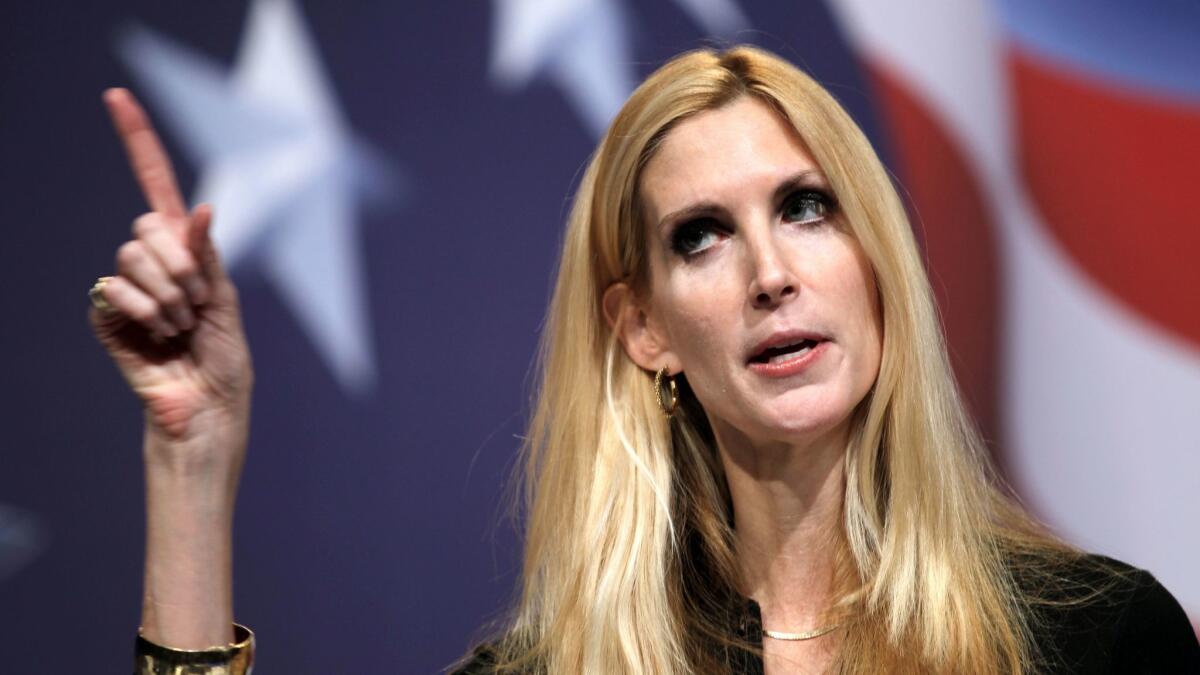Editorial: Let Ann Coulter speak

A Republican student group at UC Berkeley filed a lawsuit this week over the universityâs decision to cancel a speech planned for Thursday by the caustic conservative commentator Ann Coulter. The complaint in U.S. District Court in San Francisco by the Berkeley College Republicans, joined by the Young Americaâs Foundation, alleges that UC Berkeley âwill not permit the expression of disfavored conservative viewpoints at desirable places and times on the UC Berkeley campus.â
Itâs an explosive accusation but also an unconvincing one. We donât believe UC Berkeley is imposing a sinister ideological litmus test on speakers who come to the campus. We find more plausible the universityâs contention that its overriding concern is to protect both students and speakers such as Coulter from the sort of violence that led to the cancellation of a speech on campus in early February by another right-wing provocateur, the writer Milo Yiannopoulos.
But good intentions and legitimate concerns donât absolve the university of its fundamental responsibility to free expression and unfettered debate. Berkeley made serious mistakes in its handling of the Coulter controversy and now must work doubly hard to address the challenge of ensuring that controversial speakers invited to campus have meaningful access to student audiences.
Even allowing for the possibility of violent protests, the universityâs announcement last week that it was canceling Coulterâs appearance seemed hard to justify. The cancellation of the Yiannopoulos speech in February came two hours before he was to appear at a student union but after violence already had occurred; authorities were scrambling to respond to a real-time emergency. By contrast, Coulterâs speech was canceled days before it was to have taken place, time enough for university and police to follow leads and strategize on security measures.
Itâs important that a campus that was the birthplace of the free speech movement not succumb to what lawyers call the âhecklerâs veto.â
Then, after initially suggesting that Coulterâs speech could be rescheduled for September, university officials proposed that she speak on May 2. But Berkeley College Republicans rejected that offer, partly because that date fell during a period when many students would be too busy studying for exams (sometimes off campus) to attend a speech. Coulter says she may appear on the Berkeley campus Thursday regardless.
In their lawsuit, the campus Republicans claim that after the Yiannopoulos protests, UC Berkeley adopted an amorphous, unwritten policy for âhigh-profile speakersâ that required their appearances to take place in a âsecurableâ location and end by 3 p.m. The policy, according to the complaint, seemed designed to relegate âdisfavoredâ speakers to inaccessible venues and inconvenient times. The university denies that there is such a policy, but says it consults with police about potential security problems posed by controversial speakers. University officials also say that afternoon speeches pose less of a security issue than those in the evening.
No one who has observed recent violence in Berkeley would dismiss the universityâs safety concerns. But itâs important that a campus that was the birthplace of the free speech movement not succumb to what lawyers call the âhecklerâs vetoâ â the idea that a fear of disruptive or violent protest justifies canceling a speech by a controversial figure or shunting it to a time or place where it will have a significantly smaller audience.
UC Berkeley also needs to be careful that itâs not engaging in unintentional âviewpoint discrimination.â At Berkeley, as at many other campuses these days, itâs simply a fact of life that conservative speakers are more likely to provoke protests than liberal ones. So even if a policy is ideologically neutral on its face, and based solely on security considerations, it can have the effect of discriminating against conservative speakers if the result is that they are more likely to have their appearances canceled or restricted.
These are difficult times for university administrators, who are called upon both to ensure the safety of students and to uphold the traditions of robust debate that are supposed to define the modern university. But censorship isnât the answer. As Sen. Bernie Sanders wisely observed: âAnn Coulterâs outrageous â to my mind, off the wall. But you know, people have a right to give their two cents-worth, give a speech, without fear of violence and intimidation.â
Itâs possible to sympathize with officials at UC Berkeley as they try to fulfill their disparate responsibilities, and as they come under additional pressure to provide âsafe spacesâ for students alarmed by obnoxious political rhetoric. But the Coulter affair shows that the university needs to try harder.
Follow the Opinion section on Twitter @latimesopinionand Facebook
More to Read
A cure for the common opinion
Get thought-provoking perspectives with our weekly newsletter.
You may occasionally receive promotional content from the Los Angeles Times.










